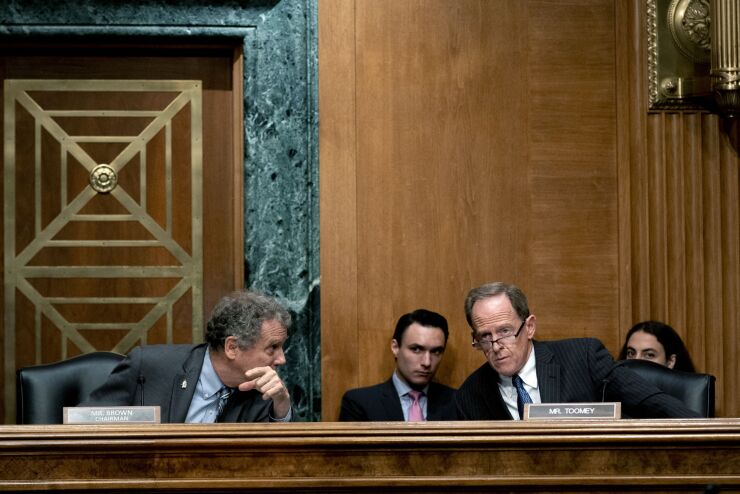WASHINGTON — Congress is moving closer to advancing legislation to address potential fallout from the transition to a new interest rate benchmark.
Regulators
At a hearing Tuesday, Republicans and Democrats agreed that providing automatic fallback language for trillions of dollars' worth of legacy loans and other contracts is a priority. Though policymakers say banks can use a new benchmark of their own choosing, legislative proposals for an automatic fallback rate favor using the Secured Overnight Financing Rate.
“Because Libor is so widely used, homeowners and students who have never heard of Libor will be at risk when it’s discontinued if we don’t take action,” Senate Banking Committee Chair Sherrod Brown, D-Ohio, said at the hearing.
Although the Alternative Reference Rates Committee — a U.S. group of market participants convened by the Federal Reserve — recommended that SOFR replace Libor, the banking agencies have said firms are free to choose a substitute benchmark that meets their needs.

But lawmakers and market participants agreed Tuesday that legislation should provide fallback language for SOFR only.
“While it’s appropriate to mandate a SOFR-based index for this relatively small universe of tough legacy contracts, for new contracts banks must have the option to choose among qualified benchmark rates — including credit-sensitive rates — as appropriate for their business models,” said Sen. Pat Toomey, R-Pa., the ranking member of the committee.
The House Financial Services Committee in July advanced a bill put forward by Rep. Brad Sherman, D-Calif., that would establish a process for legacy financial contracts to automatically swap in SOFR when most Libor settings end in 2023. The bill closely mirrors one
Brown said Tuesday that Sens. John Tester, D-Mont., and Thom Tillis, R-N.C., are working on a Senate companion bill to Sherman’s in the House.
“Under the current proposal, lenders with legacy contracts that don’t specify a Libor alternative can transition to SOFR — so long as they don’t make other changes that could harm borrowers,” Brown said. “That would allow them to avoid potentially complicated litigation.”
The ARRC has emphasized that implementing fallback language that would revert contracts to SOFR, as opposed to other rate benchmarks, would minimize legal uncertainty.
“What we believe is that the legislation would provide a structural bridge where these contracts fail, and remove uncertainty, minimize value transfer, reduce disruption and preserve good market functioning, and we think that for the legacy piece of this, we think that SOFR is far and away the best choice,” said Tom Wipf, chair of the ARRC and managing director at Morgan Stanley.
Lawmakers also raised concerns about the potential of federal legislation superseding state laws.
“To the extent that preemption of state law is necessary here, it should be done in a narrowly tailored manner, one that minimizes adverse precedential effects,” said Sen. Bill Hagerty, R-Tenn.
The ARRC and other industry participants see a need for federal legislation to compensate for an obscure law, the 1939 Trust Indenture Act, which prohibits amending securities contracts without the consent of all parties.
“As a great fan of our federalist system, which I think has provided so many benefits to our citizens, I think [I am] like you: cautious whenever we take up federal legislation that would override states rights,” said Christopher Giancarlo, former chairman of the Commodity Futures Trading Commission and senior counsel at Wilkie Farr & Gallagher, responding to the concerns raised by Hagerty. “But I think this is one case where done properly, done in a very narrowly tailored way, I think this can provide great benefit.”
While Giancarlo agreed that automatic fallback language is needed for contracts that are otherwise difficult to amend, he stressed that banks should choose whichever reference rate best suits their borrowers for future contracts.
“We have large Wall Street banks, and we have small community and minority depository institutions that make loans against very little or very illiquid collateral, and they have to have the flexibility that comes from benchmarks that reflect their cost of funding and not necessarily the cost of funding of Wall Street banks,” he said.
Toomey agreed, adding that federal legislation must “not affect any new contracts.”
“Risk-free rates like SOFR may work well for derivatives contracts and institutions active in the Treasury repo market, but they may not be well-suited for loans or certain community or regional banks,” he said.
Still, Congress does face a major obstacle to passing effective legislation, which is a fast approaching deadline for Libor's expiration.
“I think we're in a pretty tight shot clock right now,” said Wipf.
Andrew Pizor, a staff attorney at the National Consumer Law Center, said without federal legislation on the books, market participants face significant legal uncertainty.
“We're concerned that the industry is just paralyzed by litigation risk at this point. They need some clarity because they're worried that no matter what index they choose, they're going to be sued,” he said. “The sooner Congress can address this, the sooner everyone will know what the road map is going forward, and that's just going to make for a smoother transition.”





